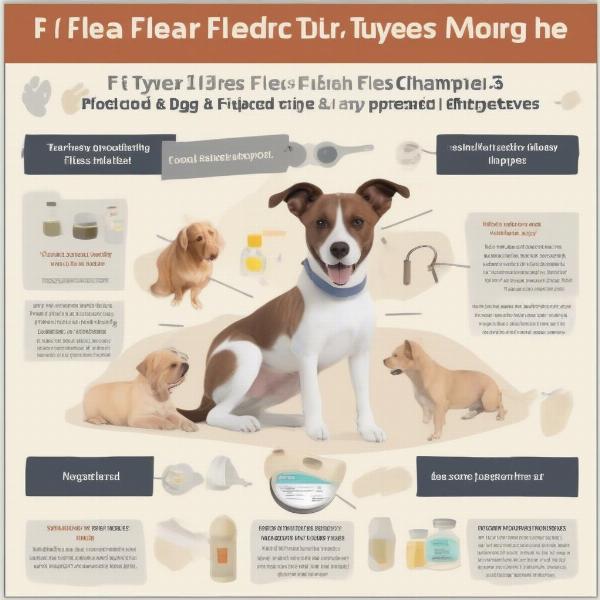Fleas are a common nuisance for dogs, causing itching, discomfort, and even health problems. Choosing the right flea medicine for your dog can be overwhelming with so many options available. This guide will cover everything you need to know about flea medicine for dogs, from different types and how they work to safety considerations and choosing the right product for your furry friend.
Understanding Flea Life Cycle and Infestations
Before diving into flea medications, it’s important to understand the flea life cycle. Fleas go through four stages: egg, larva, pupa, and adult. Adult fleas live on your dog, feeding on its blood and laying eggs. These eggs fall off into the environment, where they hatch into larvae. The larvae feed on organic debris and eventually spin cocoons, entering the pupal stage. Pupae can remain dormant for months, emerging as adult fleas when they sense a host nearby. This understanding helps explain why flea control requires a multi-faceted approach, targeting all life stages.
Types of Flea Medicine for Dogs
Several types of flea medicine are available, each with its own mechanism of action:
- Oral Medications: These are chewable tablets or pills that kill adult fleas. Some also prevent flea eggs and larvae from developing.
- Topical Treatments: These are liquids applied to your dog’s skin, typically between the shoulder blades. They spread through the skin and kill fleas on contact.
- Flea Collars: These collars release insecticide that kills and repels fleas. Some collars also offer protection against ticks and other parasites.
- Sprays: Flea sprays can be used to kill fleas on your dog and in the environment. They provide immediate relief but require frequent application.
- Shampoos and Dips: These are used for bathing your dog and killing fleas on contact. They don’t offer long-term protection.
Choosing the Right Flea Medicine for Your Dog
 Comparing Different Flea Medications for Dogs
Comparing Different Flea Medications for Dogs
The best flea medicine for your dog depends on several factors, including your dog’s age, weight, health, lifestyle, and the severity of the infestation. Consider the following:
- Age and Health: Puppies and senior dogs may require different medications than adult dogs. If your dog has any health conditions, consult your veterinarian before choosing a flea medicine.
- Lifestyle: If your dog swims frequently, a waterproof topical treatment or oral medication may be a better choice than a flea collar.
- Severity of Infestation: For heavy infestations, a combination of treatments may be necessary.
Safety Considerations for Flea Medicine
Always follow the instructions on the product label carefully. Overdosing can be harmful to your dog. Common side effects of flea medicine can include skin irritation, vomiting, and diarrhea. If you notice any unusual symptoms, contact your veterinarian immediately. Never use dog flea medicine on cats, as it can be toxic.
How to Apply Flea Medicine Correctly
Proper application is crucial for the effectiveness of flea medicine. For topical treatments, apply the product directly to your dog’s skin, not just the fur. For oral medications, make sure your dog chews the entire tablet. Always wash your hands thoroughly after applying any flea medicine.
Preventing Flea Infestations
Besides using flea medicine, you can take several steps to prevent flea infestations:
- Regular Grooming: Brush your dog regularly to remove fleas and flea dirt.
- Vacuuming and Washing Bedding: Regularly vacuum your home and wash your dog’s bedding to remove flea eggs and larvae.
- Yard Treatment: Treat your yard with a flea and tick control product to reduce the flea population in your environment.
Conclusion
Choosing the right flea medicine for dogs is essential for their health and comfort. By understanding the different types of flea medicine, safety considerations, and prevention methods, you can help your furry friend stay flea-free and happy. Consult your veterinarian for personalized recommendations based on your dog’s specific needs.
FAQ
- How often should I apply flea medicine to my dog? Most flea medications need to be applied monthly.
- Can I use dog flea medicine on my cat? No, never use dog flea medicine on cats. It can be toxic.
- What are the signs of a flea allergy in dogs? Excessive scratching, hair loss, and skin redness are common signs.
- Are there natural flea remedies for dogs? Some natural remedies exist, but their effectiveness varies. Consult your vet.
- Can fleas transmit diseases to dogs? Yes, fleas can transmit diseases like tapeworms and Bartonellosis.
- How can I tell if my dog has fleas? Look for flea dirt (small black specks) on your dog’s skin.
- Can I use multiple flea treatments at the same time? Consult your vet before combining treatments.
Related Articles
ILM Dog is your trusted source for expert advice on dog care and wellbeing. We provide comprehensive information on dog breeds, health, training, nutrition, grooming, and much more. Whether you’re a new dog owner or a seasoned expert, ILM Dog has the resources you need to help your dog live a happy and healthy life. Our focus on health and wellness extends to advice on products and accessories. For personalized guidance or further inquiries, please contact us via email at [email protected] or phone at +44 20-3965-8624. Visit us today at ILM Dog!